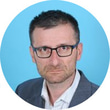- OT
- Professional support
- Optical organisations
- “We know that we can and should be contributing to a much wider understanding of healthcare”
2023 in review
“We know that we can and should be contributing to a much wider understanding of healthcare”
Optometrist and president of the European Council of Optometry and Optics (ECOO), Dr Matjaž Mihelčič, reflects on optometry’s contribution to healthcare across Europe, including the importance of learning from each other


Dr Matjaž Mihelčič
27 December 2023
A standard management challenge is to “think outside the box.” But I can’t help wonder if sometimes the problem is not the person inside the box, but those that want to keep you there. All too often those of us in optometry and optics can feel that we are being told to stay inside our box, when we know that we can and should be contributing to a much wider understanding of healthcare.
All too often those of us in optometry and optics can feel that we are being told to stay inside our box, when we know that we can and should be contributing to a much wider understanding of healthcare
The scope of practice in optometry and optics varies across Europe. This means that the extent to which eye care professionals play a role in delivering eye health services also varies. But we are increasingly hearing from our members that eye care professionals are being recognised as an important part of the health system, in ways that had not been the case before.
To give a few examples from this past year: In Poland, optometry has been included in new legislation to regulate a variety of medical professions. And in the Netherlands, work is underway to rollout a national programme for ophthalmology – Right Eye Care in the Right Place. This ambitious programme will require changes in approach from all partners as GPs, optometrists and ophthalmologists have become jointly responsible for all patients with eye problems.
So, how do we continue to push for more integrated care and a greater role for optometry and optics? It may require regulatory change or changes to educational practice. But in many cases, it simply needs changes in attitudes for health care systems to make better use of the full range of appropriately qualified health care professionals. Delivering integrated eye care means that legislators, health policy advisers, and medical professionals all need to look at care in the round – learning from each other, from patients, and using all resources available to them.
We are increasingly hearing from our members that eye care professionals are being recognised as an important part of the health system, in ways that had not been the case before
Learning from each other
We in the eye care professions also benefit from seeing the picture from different angles. ECOO helps members to do this with resources such as the Blue Book. This provides valuable data on the scope of practice by country. This enables member countries to find out how things are done in other countries and allows them to give evidence to regulators that different approaches are both possible and safe.At our spring and autumn meetings, our members always comment on how much they learn from hearing from other members about what they are doing in their countries. As one of our members commented after our autumn meeting this year in Utrecht: “Hearing about how things operate in different countries makes you think differently about your own operations, policy and legislation.”
So, what do we need to do in 2024 if we are going to achieve better eye care services for our patients? Firstly, we need to continue to work with regulators and health administrators to accelerate the shift to integrated eye care services. We also need to continue to improve educational standards in optometry and optics across Europe – I would like to see more countries adopting the gold standard of the European Diploma in Optometry and the European Qualification in Optics. Finally, and most importantly, there needs to be a willingness on all sides to listen and learn from others – in your own country or another, your own profession or another.
About the author
Dr Matjaž Mihelčič is president of the European Council of Optometry and Optics (ECOO), and is a practising optometrist in Bled, Slovenia. He is also a lecturer on the Master’s programme in optometry at Aalen University. ECOO represents eye care professionals across 23 European countries, including the UK.
Advertisement

Comments (0)
You must be logged in to join the discussion. Log in